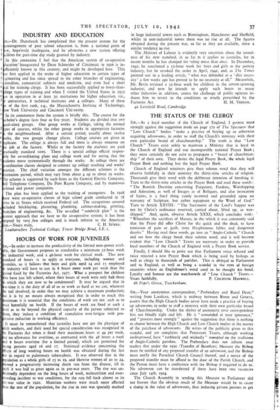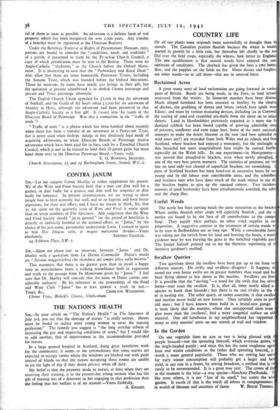Ste,—Your anonymous correspondent, " Prebendary and Rural Dean," writing from
Laodicea, which is midway between Rome and Geneva, asserts that the High Church bodies never have made a practice of buying up advowsons in order to staff a ministry with their own particular brand of Churchmanship. Under the shelter of anonymity your correspondent hits out blindly right and left. He is " astounded at your ignorance," and " protests most strongly " against the suggestion that there is nothing to choose between the High Church and Low Church bodies in the matter of the purchase of advowsons. He writes of the publicity given to this scandal, and yet complains that Protestant Trusts, although working underground, have " ruthlessly and wickedly " trampled on the traditions of Anglo-Catholic parishes. The Prebendary does not inform your readers that under the 1930 (Transfer of Benefices) Measure the Bishop must be notified of any proposed transfer of an advowson, and the Bishop must notify the Parochial Church Council thereof, and a notice of the proposed transfer must be affixed to the door of the Parish Church, and the Patron must have a conference with the Bishop if required to do so. No advowson can be transferred if there have been two vacancies since July 14th, 1924.
The Church Assembly in sending this Measure to Parliament did not foresee that the obvious result of the Measure would be to cause a slump in the value of advowsons, thus inducing private patrons to get rid of them as soon as possible. An advowson is a definite form of real property which has been recognised for over 1,000 years. Any transfer of a benefice must be registered at the Diocesan Registry.
Under the Benefices (Exercise of Rights of Presentation) Measure, 1931, patrons are bound to consider the " conditions, needs and traditions " of a parish, if presented to them by the Parochial Church Council, a copy of which presentation must be sent to the Bishop. There were no Anglo-Catholic " traditions " in the Church before the Oxford Move- ment. It is interesting to note that the " Prebendary and Rural Dean " does allow that there are some honourable Protestant Trusts, including the Simeon Trust, which was founded before the Oxford Movement. Those he mentions by name have nearly SW livings in their gift, but the spoliation at present adumbrated is to abolish Crown patronage and private and Trust patronage wholesale.
The English Church Union appealed for £1,00o to buy the advowson of Solihull, and the Guild of All Souls asked j,-,5,000 for die advowson of Shenley in Hens, although the advowson had been presented to that Anglo-Catholic Society as a free gift. It rassed into the hands of the Diocesan Board of Patronage. Was this a transaction in the " traffic of souls "? .
" Traffic of souls " is a phrase which has been bandied about recently when there has been a transfer of an advowson to a Protestant Trust, but is never used when bishops .ndulge in this absolutely legal mode of acquiring advowsons, or when Diocesan Boards of Patronage receive advowsons which have been paid for in ham cash by a Parochial Church Council, which is not to be trusted to hold their ill-gotten gains but must hand them over to the Diocesan Patronage Board.—Yours truly,



























 Previous page
Previous page